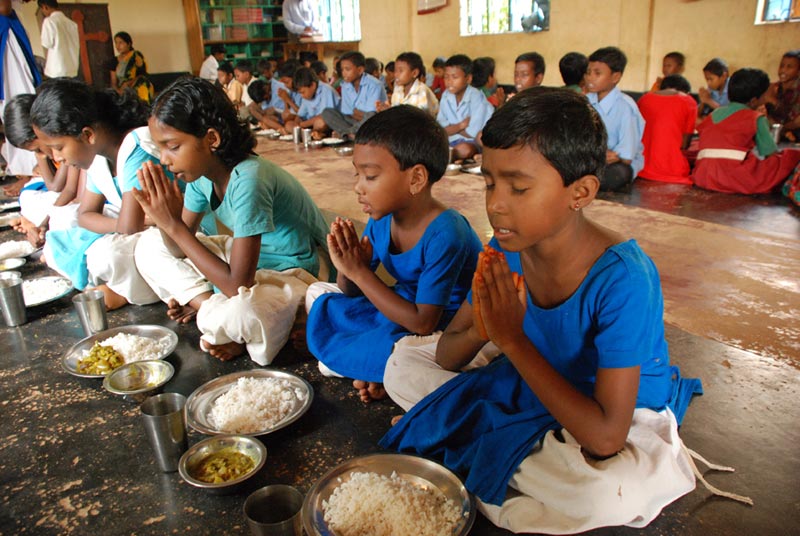 Everyone does it: from the Burmese and Balinese to the Inuit and Icelanders. In the United States, almost half of us do it, making it one of the most common of our shared rituals.
Everyone does it: from the Burmese and Balinese to the Inuit and Icelanders. In the United States, almost half of us do it, making it one of the most common of our shared rituals.
We give thanks for our food with prayer, with rituals and dance, before meals, after eating, and in praise of a bountiful harvest. We thank someone, or something—mother, a god, the earth, the sun, the soil, the rain, or the people joining us at the table.
Theologist Laurel Schneider, the author of Polydoxy: Theology of Multiplicity and Relation , said that in the time before pasteurization and refrigeration, “blessings may have been part purification (we pray that this food will not mysteriously kill us)” along with simple gratitude and the practice of “pleasing God/the spirits/the ancestors.” Acknowledging, she says, that the food “is not ours to begin with, but loaned to us” by those entities keeps us humble and in proper harmony. “I do like the universality of blessing food,” she says. “It reminds us that our bodies are part of spirituality, too.”
Beyond the spiritual, our bodies benefit from a pause to give thanks: “Taking a moment of gratitude before you start eating,” says chef and nutritionist Rebecca Katz, author of The Cancer-Fighting Kitchen, “gives you the opportunity to breathe and fully take in the sight and smell of your food.” That pause, she says, puts our body in a parasympathetic state, taking us out of our default “fight or flight” state and making food easier to digest. These mealtime blessings from around the world are something to be thankful for.
Israel
Birkat Hamazon is Hebrew for “blessing on nourishment” or, often, “grace after meals.” Though the Birkat has several stanzas, Jews all over the world say a simple, single line before eating, depending on the food they are blessing. For fruit, for instance, it is Blessed are you, lord our god, king of the universe, who has given us fruit of the vine.
India
Hinduism considers food a gift from God, to be treated with respect, for what we eat determines our mental and physical well-being. Before it is eaten, food is offered to God, in a ritual (called prasada) that is believed to purify the mind, body, and spirit. One blessing goes: “May the Lord accept this, our offering, and bless our food that it may bring us strength in our body, vigor in our mind, and selfless devotion in our hearts for His service.”
Japan
The Japanese start a meal bowing the head, bringing the hands together, and saying itadakimasu, which means “I am receiving.”
Ghana
Thanks for a meal is simple:
Earth, when I am about to die
I lean on you
Earth, while I am alive,
I depend on you.
Albuquerque, New Mexico
“The Spirit Bowl is taught as a way of life; it is second nature when sitting down to partake of food or beverage that you feed the spirits,” says Travis Suazo of the Laguna/Acoma and Taos Pueblo. “When the Spirit Bowl gets full, the contents are sprinkled upon the earth with an accompanying prayer and cornmeal or corn pollen.”
Latin America
A simple grace:
To those who have hunger,
Give bread
And to those who have bread,
Give the hunger for justice
Hartford, Connecticut
In the official birthplace of American Sign Language, gratitude for food is expressed using the sign for thank you: The signer moves a hand from the mouth forward to display a flat palm.
Burma, Laos, and Cambodia
Most Theravada Buddhist monks eat only once or twice a day and bless their food with this chant:
Wisely reflecting, I use this food not for fun, not for pleasure, not for fattening, not for beautification, but only for the maintenance and nourishment of this body, for keeping it healthy, for helping with the Spiritual Life.
Thinking thus, I will allay hunger without overeating, so that I may continue to live blamelessly and at ease.
Pakistan
Though many Pakistani families say an entire Surah Fatiha (a complete chapter of the Koran), many precede each meal by simply saying, “Bismillah Al-rahman, Al-rahmin,” which means “I begin in the name of God most gracious and ever merciful.”
Iran
As in Pakistan, Muslims in most Islamic countries say the “Bismillah ar-Rahman” before eating a meal, then pray together at the end by saying, “Thank you, O Allah, for feeding
“Saying Grace: Mealtime Blessings Around the World” was originally published on Spirituality & Health. To view the original article, click here.
To find out about Rose’s thoughts on how to live a happier life, click here


